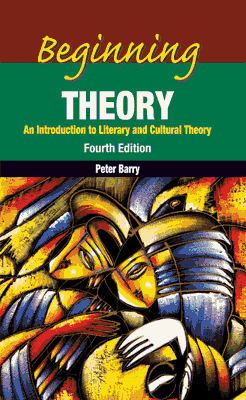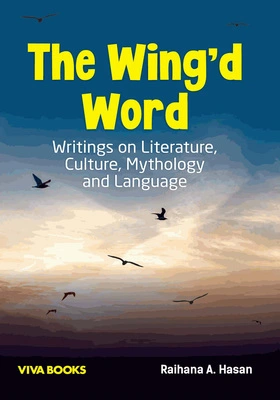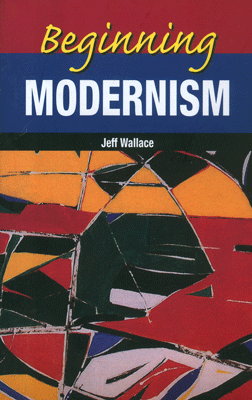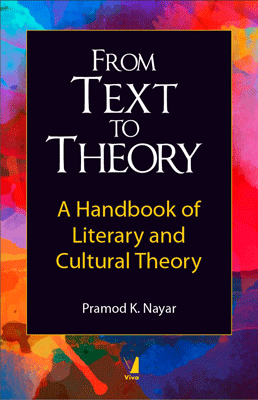Beginning Theory, 4/e
Beginning Theory, 4/e
An Introduction to Literary and Cultural Theory
₹445.50 ₹495.00 Save: ₹49.50 (10%)
Go to cartISBN: 9789387925564
Bind: Paperback
Year: 2020
Pages: 384
Size: 140 x 216 mm
Publisher: Manchester University Press
Published in India by: Viva Books
Exclusive Distributors: Viva Books
Sales Territory: India, Nepal, Pakistan, Bangladesh, Sri Lanka
Review:
“Always reassuringly urbane, and often witty... Barry's book remains important, especially as a work of mediation between those who would innately be inclined to ‘take’ or ‘leave’ theory.”
—Martin Blocksidge, The Use of English: The English Association Journal for Teacher of English
Description:
Beginning theory has been helping students navigate through the thickets of literary and cultural theory for over two decades. This new and expanded fourth edition continues to offer readers the best single-volume introduction to the field.
The bewildering variety of approaches, theorists and technical language is lucidly and expertly unravelled. Unlike many books which assume certain positions about the critics and the theories they represent, Beginning theory allows readers to develop their own ideas once first principles and concepts have been grasped.
The book has been updated for this edition and includes a new introduction, expanded chapters, and an overview of the subject (“Theory after “Theory”“) which maps the arrival of new “isms” since the second edition appeared in 2002 and the third edition in 2009.
Target Audience:
Students and academicians of literature.
Contents:
Acknowledgements
Preface to the fourth edition
Introduction • About this book • Approaching theory • My own “stock-taking”
Chapter 1. Theory before “theory” • The history of English studies • Ten tenets of liberal humanism • Literary theorising from Aristotle to Leavis • some key moments • Liberal humanism in practice • The turn to “theory” • Some recurrent ideas in critical theory • Selected reading
Chapter 2. Structuralism • Structuralist chickens and liberal humanist eggs • Signs of the fathers • Saussure • The scope of structuralism • What structuralist critics do • Structuralist criticism: examples • Selected reading
Chapter 3. Post-structuralism and deconstruction • Some theoretical differences between structuralism and post-structuralism • Post-structuralism • life on a decentred planet • A note on the translation of Of Grammatology and on “reading” • Structuralism and post-structuralism • some practical differences • What post-structuralist critics do • Deconstruction: an example • Selected reading
Chapter 4. Postmodernism • What is postmodernism” What was modernism” • “Landmarks” in postmodernism • Habermas, Lyotard, and Baudrillard • What postmodernist critics do • Postmodernist criticism: an example • Selected reading
Chapter 5. Psychoanalytic criticism • Introduction • Should we say “unconscious” or “subconscious” when discussing Freudian ideas” • How Freudian interpretation works • Freud and evidence • What Freudian psychoanalytic critics do • Freudian psychoanalytic criticism: examples • Lacan • What Lacanian critics do • Lacanian criticism: an example • Selected reading
Chapter 6. Feminist criticism • Feminism and feminist criticism • Feminist criticism and the role of theory • Feminist criticism and language • Feminist criticism and psychoanalysis • What feminist critics do • Feminist criticism: an example • Selected reading
Chapter 7. Queer theory • Introduction • Queer theory and lesbian feminism • Queer theory and libertarian feminism • What queer theorists do • Queer theory: an example • Selected reading
Chapter 8. Marxist criticism • Beginnings and basics of Marxism • Marxist literary criticism: general • “Leninist” Marxist criticism • “Engelsian” Marxist criticism • The influence of Althusser • What Marxist critics do • Marxist criticism: an example • Selected reading
Chapter 9. New historicism and cultural materialism • New historicism • New and old historicisms • some differences • New historicism and Foucault • Advantages and disadvantages of new historicism • What new historicists do • New historicism: an example • Cultural materialism • How is cultural materialism different from new historicism” • What cultural materialist critics do • Cultural materialism: an example • Selected reading
Chapter 10. Postcolonial criticism • Background • Postcolonial reading • What postcolonial critics do • Postcolonial criticism: an example • Selected reading
Chapter 11. Stylistics • Stylistics: a theory or a practice” • A brief historical account: from rhetoric, to philology, to linguistics, to stylistics, to new stylistics • How does stylistics differ from standard close reading” • The ambitions of stylistics • What stylistic critics do • Stylistics: examples • Note • Selected reading
Chapter 12. Narratology • Telling stories • Aristotle • Vladimir Propp • G”“rard Genette • “Joined-up” narratology • What narratologists do • Narratology: an example • Selected reading
Chapter 13. Ecocriticism • Ecocriticism or green studies” • Culture and nature • Turning criticism inside out • The Anthropocene, and things • What ecocritics do • Ecocriticism: an example • Selected reading
Chapter 14. Literary theory • a history in ten events • The Indiana University “Conference on Style”, 1958 • The Johns Hopkins University international symposium, 1966 • The publication of Deconstruction and Criticism, 1979 • The MacCabe affair, 1981 • The publication of Eagleton's Literary Theory: An Introduction, 1983 • J. Hillis Miller's MLA presidential address,1986 • The Strathclyde University “Linguistics of Writing” conference, 1986 • The scandal over Paul de Man's wartime writings, 1987”88 • Jean Baudrillard and “The Gulf War never happened”, 1991 • The Sokal affair, 1996
Chapter 15. Theory after “Theory” • Legacies of theory • Presentism • Presentism in practice • New aestheticism • New aestheticism in practice • Cognitive poetics • Cognitive poetics in practice • Consilience and “conciliatory” approaches to literary studies • Posthumanism
Appendices • Appendix 1: Edgar Allan Poe, “The Oval Portrait” • Appendix 2: Dylan Thomas, “A Refusal to Mourn the Death, by Fire, of a Child in London” • Appendix 3: William Cowper, “The Castaway”
Where do we go from here” Further reading • General guides • Reference books • General readers • Applying critical theory: twelve early examples • Against theory
Index
About the Author:
Peter Berry is Professor of English at Aberystwyth University.







